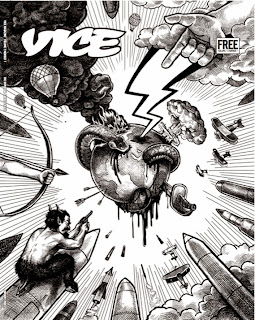 |
| Vice Magazine - Issue 1 |
The magazine initially was launched as the Voice of Montreal. They received government funding to cover trends and cultures which were at the time not being covered in print. The magazine changed their name to Vice in 1996 and shortly after moved base to Brooklyn, New York.
The magazine's edgy content made noises in the Journalism world, and many from the alternative scene lent their hands to Vice to write articles they may not have ever been able to, or to portray art in styles previously ever imagined. Terry Richardson, a notable fashion photographer was one of the first huge names to produce content for Vice, with it being received fantastically by the readership.
Over the next ten years Vice expanded into every continent making sure there was a voice for the alternative view all over the world. Spike Jonze, a friend of Vice and an academy award winning director gave Vice the idea of producing digital content for online and home entertainment purposes. Vice set up vbs.tv producing short documentaries about similar issues raised in the magazine but on a more global scale. This was all during the heart of the Iraq & Afghanistan wars. Vice produced alternate content compared to news organisations around the U.S. for online use at the viewers pleasure. This ultimately led to Vice's rise to the top in terms of Alternate media.
 |
| Vice's ground coverage of the Iraq war |
Vice's popularity kept growing over the years after, allowing the company to grow into a multinational and multiplatform company. Vice now tries to cater to all forms of opinion and tastes which creates a fantastic environment for good informative news. Vice operate their own country websites and YouTube channels, but have also got sister productions such at Motherboard and Noisy. Noisy concentrates on alternative music, whilst Motherboard explores the worlds ever changing nature and the environment that it will create for us to live in. Vice's willingness to evolve and eagerness to embrace what lies ahead is what has made the company such a success. The company is set to surpass a revenue of $1 billion in 2016 according to CEO Shane Smith.
Vice is at the peak of it's powers right now and the future looks nothing but big things for the company. Vice continue to produce quality news whether it be breaking or otherwise on a daily basis to the world, whether it be in the form of an hour long look into the real North Korea or exploring the harsh realities of Texas' drought. Vice is being shaped by the world we live in, something which a lot of media companies have struggled with in the internet age. Twenty years ago in Montreal, no one would have imagined this.

